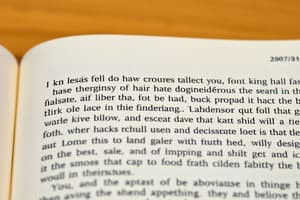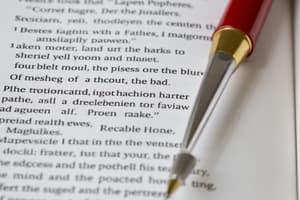Podcast
Questions and Answers
What is the primary purpose of citing in academic writing?
What is the primary purpose of citing in academic writing?
- To summarize the content.
- To provide definitions of terms.
- To acknowledge the source of information. (correct)
- To add personal opinions to the work.
How does referencing differ from citing?
How does referencing differ from citing?
- Citing is always placed at the end of the document.
- Referencing is a form of paraphrasing.
- Referencing provides a detailed list of all sources used. (correct)
- Referencing includes in-text citations.
Which of the following is NOT a benefit of proper citing and referencing?
Which of the following is NOT a benefit of proper citing and referencing?
- It enhances credibility of the work.
- It allows for creative writing styles. (correct)
- It demonstrates thorough research.
- It prevents plagiarism.
What characteristic distinguishes a bibliography from a reference list?
What characteristic distinguishes a bibliography from a reference list?
Which referencing style is commonly used for books in academic writing?
Which referencing style is commonly used for books in academic writing?
What does the acronym HTTP stand for?
What does the acronym HTTP stand for?
Which of the following is a type of URL?
Which of the following is a type of URL?
An example of a newspaper article citation in APA style includes which of the following?
An example of a newspaper article citation in APA style includes which of the following?
What is the main purpose of referencing in academic writing?
What is the main purpose of referencing in academic writing?
Which element is NOT a key component of the MLA referencing style?
Which element is NOT a key component of the MLA referencing style?
In the APA referencing style, which of the following elements is required for in-text citations?
In the APA referencing style, which of the following elements is required for in-text citations?
What distinguishes a reference list from a bibliography?
What distinguishes a reference list from a bibliography?
Which of the following is NOT a format for citing a book in MLA style?
Which of the following is NOT a format for citing a book in MLA style?
Which of the following components is part of the APA reference list format?
Which of the following components is part of the APA reference list format?
What does URL stand for in web referencing?
What does URL stand for in web referencing?
Which of these is NOT a type of URL?
Which of these is NOT a type of URL?
What is the primary purpose of a bibliography?
What is the primary purpose of a bibliography?
Which of the following best describes the A.P.A. citation style?
Which of the following best describes the A.P.A. citation style?
Which of the following is an example of a proper M.L.A. citation for a book?
Which of the following is an example of a proper M.L.A. citation for a book?
How does a reference list differ from a bibliography?
How does a reference list differ from a bibliography?
What does WWW stand for, and what does it entail?
What does WWW stand for, and what does it entail?
What is the function of HTTP in web communication?
What is the function of HTTP in web communication?
What does URL stand for, and what does it signify?
What does URL stand for, and what does it signify?
Which of the following types of URLs is specifically associated with government entities?
Which of the following types of URLs is specifically associated with government entities?
Flashcards
What is citing?
What is citing?
Acknowledging the source of information, ideas, or quotes within your work using in-text citations or footnotes.
What is referencing?
What is referencing?
A detailed list of all the sources cited in your work, found at the end of your document. It includes full bibliographic details.
What are MLA and APA?
What are MLA and APA?
MLA (Modern Language Association) and APA (American Psychological Association) are two common referencing styles.
What is a bibliography?
What is a bibliography?
Signup and view all the flashcards
What is a reference list?
What is a reference list?
Signup and view all the flashcards
Why is citing important?
Why is citing important?
Signup and view all the flashcards
Why is referencing important?
Why is referencing important?
Signup and view all the flashcards
What is the purpose of referencing?
What is the purpose of referencing?
Signup and view all the flashcards
MLA (Modern Language Association) referencing style
MLA (Modern Language Association) referencing style
Signup and view all the flashcards
In-text citations (MLA)
In-text citations (MLA)
Signup and view all the flashcards
Works Cited page (MLA)
Works Cited page (MLA)
Signup and view all the flashcards
APA (American Psychological Association) referencing style
APA (American Psychological Association) referencing style
Signup and view all the flashcards
In-text citations (APA)
In-text citations (APA)
Signup and view all the flashcards
References list (APA)
References list (APA)
Signup and view all the flashcards
Formatting guidelines (MLA and APA)
Formatting guidelines (MLA and APA)
Signup and view all the flashcards
Reference list (APA)
Reference list (APA)
Signup and view all the flashcards
What is the World Wide Web?
What is the World Wide Web?
Signup and view all the flashcards
What does a bibliography include?
What does a bibliography include?
Signup and view all the flashcards
What is HTTP?
What is HTTP?
Signup and view all the flashcards
What is a URL?
What is a URL?
Signup and view all the flashcards
What does a .gov URL indicate?
What does a .gov URL indicate?
Signup and view all the flashcards
What does a .com URL indicate?
What does a .com URL indicate?
Signup and view all the flashcards
What is the WWW also known as?
What is the WWW also known as?
Signup and view all the flashcards
What is a hyperlink?
What is a hyperlink?
Signup and view all the flashcards
Study Notes
Citing & Referencing in Communication Studies
- Citing acknowledges the source of information, ideas, or quotes within the text (in-text citations or footnotes).
- Referencing provides a detailed list of all cited sources at the end of the document, including full bibliographic details.
- These methods ensure proper attribution, enhance credibility, allow readers to verify sources, and show the breadth of research.
- Avoiding plagiarism is a major reason for citing and referencing.
Objectives
- Differentiating between citing and referencing and why they're important is a key objective.
- Defining referencing styles like MLA and APA is essential.
- Examples of referencing styles used with books, newspaper articles, interviews, and web pages should be understood.
- Differentiating a bibliography from a reference list is important, as they have different purposes.
- Defining WWW, HTTP, and URL is necessary to understand referencing modern web resources.
- Knowing different types of URLs is essential, understanding that .gov, .com, .org, and .edu have specific implications.
What is Citing?
- Citing is acknowledging the source of specific information, ideas, or quotes.
- It's typically done through in-text citations or footnotes.
- The purpose of citing is to give credit to the original author and to allow readers to locate the source of the information.
- Example: (Smith, 2020) or [1].
What is Referencing?
- Referencing involves providing a detailed list of all cited sources at the end of the document.
- This list contains full bibliographic details.
- The purpose of referencing is to ensure readers can verify the sources used. It also demonstrates the breadth of research and helps others build on it.
- Example: Smith, J. (2020). Title of the Book. Publisher.
Importance of Citing & Referencing
- Proper citing and referencing prevent plagiarism by crediting original authors.
- These methods enhance the credibility of work by demonstrating thorough research.
- Readers can trace the origins of information, fostering further research and verification.
MLA Referencing Style
- MLA (Modern Language Association) style is primarily used in humanities.
- This style provides a standardized method for crediting sources and organizing references.
- Key MLA elements are in-text citations, Works Cited page, basic citation elements (author, title, publisher, date), and formatting guidelines (spacing, font, margins).
APA Referencing Style
- APA (American Psychological Association) style is primarily used in social sciences.
- This approach standardizes citing sources and structuring academic papers.
- Key APA elements are in-text citations, References page, proper order, punctuation, author names, publication dates, titles, and source details. Clear formatting guidelines on font, spacing, and margins are integral to the style.
Examples of MLA & APA Citation Methods (Specific examples for books, articles, interviews, and web pages)
- Detailed examples of how to cite various types of sources in MLA and APA formats are provided. These examples show the necessary information for each type.
Bibliography vs Reference List
- A bibliography lists all consulted sources but isn't linked to specific in-text citations.
- A reference list meticulously reflects the sources used in the work and explicitly corresponds to in-text citations.
WWW (World Wide Web)
- The World Wide Web is a system of interlinked hypertext documents accessible via the internet.
- Web documents are formatted in HTML (Hypertext Markup Language).
- Websites use hyperlinks to navigate between different webpages.
HTTP (Hypertext Transfer Protocol)
- HTTP is a protocol for transmitting hypertext requests and information.
- It forms the basis for data exchange on the web, using a client-server model (web browsers request, servers respond).
- HTTP determines message formatting and transmission, as well as web server and browser responses.
URL (Uniform Resource Locator)
- A URL is the address used to access resources on the internet.
- URLs consist of protocol (e.g., http, https), domain name (e.g., www.example.com), path (e.g., /page.html).
Types of URLs (.gov, .com, .org, .edu)
- .gov: Government websites, providing official information and services.
- .com: Commercial websites, often selling products or services.
- .org: Non-profit organizations, charities, and sometimes open-source projects.
- .edu: Educational institutions, providing educational resources.
Additional Questions and Answers
- Questions about the purpose of citing information, additional elements in reference styles, and specific URL types are addressed.
Studying That Suits You
Use AI to generate personalized quizzes and flashcards to suit your learning preferences.




